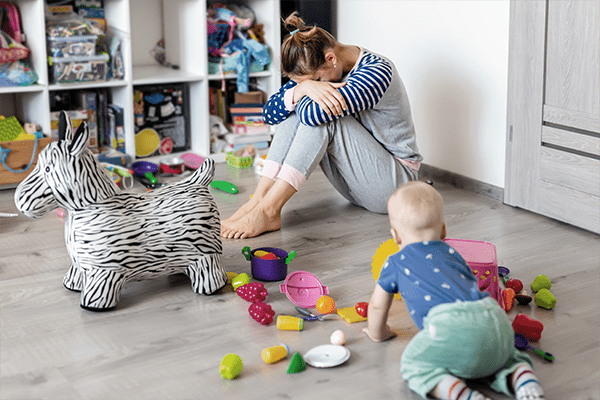Parenting resources
How to Overcome Parental Burnout
Seven ways to cope with parental burnout.
What is parental burnout?
Parenting comes with endless joys, but it comes with its challenges too. Research on parental burnout first started more than 30 years ago, but new studies indicate that the imbalance between the demands and rewards of parenting are the root cause. Board Certified Neurologist and Life Coach, Dr. Puja Aggarwal, told Healthline, “Parental burnout is the physical, mental, and emotional exhaustion that one feels from the chronic stress of parenting.”
Burnout is something that many moms and dads struggle with and it’s nothing to be ashamed of. Parenting takes up a lot of time and energy, which can be difficult to gain back, leaving some parents feeling exhausted or like they have nothing left to give.

Signs and symptoms of parental burnout
Parental burnout impacts people in different ways. It can depend on your child’s age—maybe you’re up with an infant or toddler at night so you’re tired all the time, or your teenager is going through a rebellious phase resulting in undue stress for you and your co-parent. These types of parenting challenges can lead to varying effects on your physical and mental health. Some common signs and symptoms of parental burnout include:
- Physical or mental exhaustion
- Feeling isolated or alone
- Distancing yourself from your kids
- Loss of motivation
- Headaches, joint and muscle pains, or neck pain
- Depression
- Short temper or irritability
- Change in appetite
- Poor sleep
- Brain fog, confusion, or forgetfulness
- Feeling hopeless, helpless, or like a failure
- Obsessive-compulsive tendencies
- Increased stress levels
How to cope with parental burnout
Every parent goes though trials and tribulations, and it’s completely normal to experience symptoms of burnout from time to time. Here are seven healthy ways moms and dads can work to overcome parental burnout:
1. Prioritize sleep & rest
For parents, getting enough sleep can be a huge challenge, which is why you must actively make it a priority. Take advantage of time when your child is with their other parent to rest and relax. When your child is in your care, practice “wind-down” techniques to help them relax or sleep, which will help you as well. Depending on their age, this may include singing them a lullaby, reading to them, reading with them, stargazing, or yoga.

2. Take time for self-care
Self-care is a very important part of reducing stress. Parents must take time for themselves in order to give back to their children. Self-care looks different for everyone. You can try taking a bath, reading, meditating, watching your favorite movie or tv show, or working on a small home project. Just spend time doing something that makes you happy.
3. Set healthy boundaries
Boundaries are beneficial in all relationships, including those with your children. It’s okay to say no and recognize when parenting pressures or expectations that are too much for you. Prioritize the tasks you need to accomplish to keep your children safe and healthy. Trying to bite off more than you can chew can end up causing you to break down, leading to adverse effects on your children and your mental health. If setting healthy boundaries with your co-parent is also contributing to parental burnout, check out this advice from Certified Divorce Transition & Recovery Coach, Tessa Noel.
4. Focus on the positives
It might sound cliché, but positive thoughts can lead to a positive outlook and actions. As a parent, your children bring you so much joy, and it’s important to focus on the things about parenting that make you happy. This can start to improve your attitude and the way you cope with stress, helping you reduce symptoms of burnout.

5. Make time for exercise
Scientifically, exercise has been proven to reduce stress. Almost any form of exercise can act as a stress reliever, boosting endorphins and distracting you from day-to-day worries. You don’t have to do a full on workout to make this happen. Anything you can do to stay active will be beneficial. As a parent, you may be able to get your children involved as well! Once your kids are old enough, consider including them in your exercise routine.
6. Tap into your support network
Talk to trusted friends and loved ones about the feelings you are experiencing, especially other parents. The people who care about you most might be able to offer helpful advice or solutions. Sometimes, it just simply helps to discuss your feelings out loud. For parents, having a support network is vital. If that’s something you lack, consider joining a parenting group or parenting classes where you can meet like-minded individuals.
7. Know when to get help
Most of the time, you can overcome parental burnout by practicing these techniques as well as others. However, if you are not able to cope with parental burnout on your own, you should seek professional help. If your symptoms continue to worsen, a licensed therapist, psychologist, or parenting coach may be able to assist you.